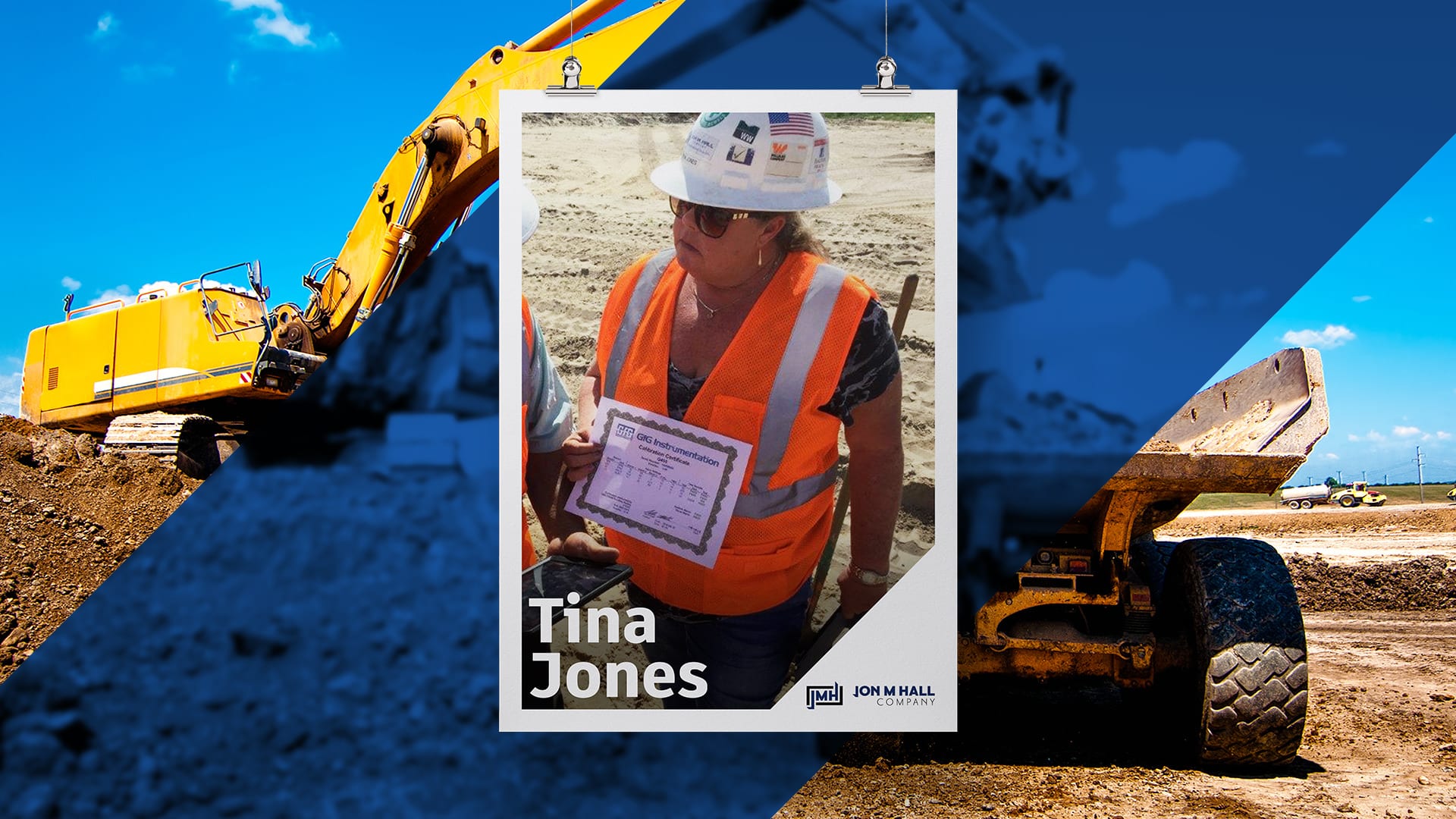Help us improve your experience. See content that is made for you!
See how IBM increased their efficiency by up to 30%!

Help us improve your experience. See content that is made for you!
See how IBM increased their efficiency by up to 30%!


Though safety is 24/7/365, professionals throughout the industry come together during the annual Construction Safety Week each year to reaffirm their commitment to safety and honor the people on site who make it happen day-in and day-out. This week, we have been celebrating incredible individuals and innovations that are helping to create safer jobsites.
Tina Jones, the Director of Safety at the Florida-based premiere site developer Jon M Hall, knows the importance of a safe jobsite. And with her experience as a finish operator, foreman, and superintendent, she also knows a thing or two about some of the challenges of getting every worker to buy in to safety best practices.
While a big part of Tina's job is ensuring that the proper safety measures are being followed, she's also learned a lot about how to improve safety from the people she oversees on the jobsite. In this special Safety Week edition of Behind the Build, we caught up with Tina to chat about her career trajectory, developing a culture of safety, safety standards during COVID, and more. Here's a closer look:
It started back in 2002 when I came to Jon M Hall Company as a finish operator, straw boss dirt foreman. I was taught a few things and just really picked it all up from there. I was a finish operator, so becoming a dirt foreman was everything to me.
I caught on really quick to things, and there came the point when they were looking for superintendents. My name was suggested, and I was eventually selected as a superintendent. I did that for about 10 years and loved it. I started doing $300,000 job subdivisions and eventually moved up to multi-million dollar jobs. Unfortunately, when the recession hit, I was let go and wound up working back as a foreman for another company. But a few years later after, the economy recovered in 2012, I was the first one that Jon M Hall called back and resumed working as a superintendent. I worked as a superintendent until 2015, until ownership tapped me to lead the safety department since I had gained so much experience in other various roles and knew the industry so well. Now I oversee all the safety and environmental issues for the company.
I love my job and what I do. I'm very fulfilled with a career that I never thought I'd be in. I was raised with dirt bikes, horses, and on a farm, so construction just became home to me.
We definitely hold our superintendents and our foremen accountable for the safety of their crews. We ensure that they are in compliance. We conduct safety audits for jobsites. We just make sure that all the crews are held 100% accountable.
As I said, when we visit the jobsite, we do site audits. And if they don't correct anything that we find, then there's a disciplinary action that's involved. For example, we'll take money away from their end-of-the-year bonus if they don't get certain things that we've identified corrected. Nobody wants to lose money out of their bonus. It's the ultimate incentive to correct what we find.
Our safety department is just everything here — it’s our culture. We preach safety and quality over quantity. It's something discussed from the executive level all the way down to the laborers. If you don't have the top executives supporting safety, it's never going to work — it just won't work.
Everyone has a role in maintaining a safe jobsite. We like for our workers to throw ideas in a hat and suggest ways to be better. We love getting the field involved in safety. And if they have good ideas, we take those and run with them. What's neat is our workers are always so proud if one of their ideas becomes a reality. It's just a matter of working together and listening to those that you work with. It's the ideas that these folks come up with and that we're able to implement. These workers may not have the fancy degrees that a lot of professionals in other various organizations do, but they're so smart when it comes to construction and identifying untapped opportunities.
I'm just very passionate about my team in the field. I want to go over and beyond for them. Keeping them safe, getting them home to their families safe — that's what drives you. That's what we preach every day.
COVID really turned things around in 2020. We didn't suffer on the construction side of it as much as other industries did, but it still has had a big impact on how our crews work on site. We've done everything we can to keep them safe from this virus. We supply hand sanitizer and antibacterial soaps. Once an employee leaves a piece of equipment, they have to spray it down. We also supply masks, gloves — everything. We go over and beyond that to make it easy for our employees. We also socially distance in our meetings and as best as we can on the site. I think COVID will be something that we're going to have to manage well into the future, but hopefully not at the intensity that we do now.
Again, it's about listening to our workers and seeing what they're working on and what ideas they have. For example, we had this one foreman. I was out on his jobsite, and he had these fishing magnets. He had two of them on this thick rope. I said, "What are you going to do with that?" He told me that he uses it to help prevent a back injury. It was the neatest little thing. You put the rope on a manhole, one guy gets on each side of it with the rope and the magnet, and then you lift it forward so now you're not bending over. You're at waist level, so you're not bending at all. And it feels like it only weighs 10 pounds instead of 89. It's amazing. Our owners are now in business with the worker who came up with this to patent the invention. I can't wait for everyone to see it.
The bottom line is that we're here to prevent any kind of injury. That's just like one of the great success stories with that. And that foreman was just ecstatic that the owner would do something like that with him.

May we collect and use your data?
Learn more about the Third Party Services we use and our Privacy Statement.May we collect and use your data to tailor your experience?
Explore the benefits of a customized experience by managing your privacy settings for this site or visit our Privacy Statement to learn more about your options.